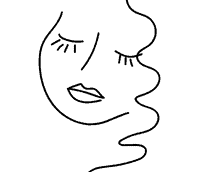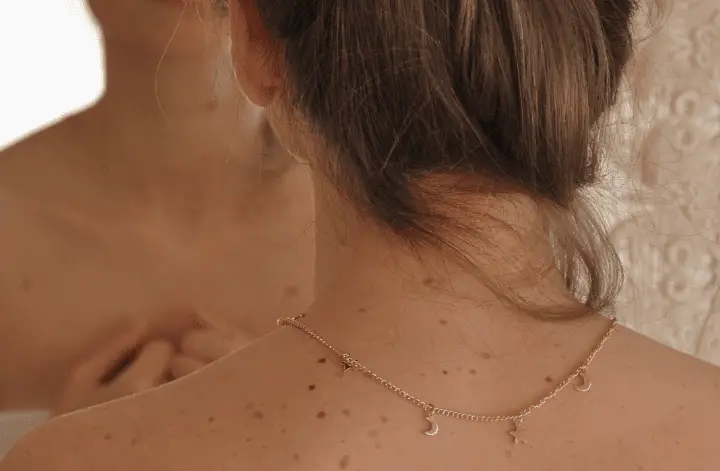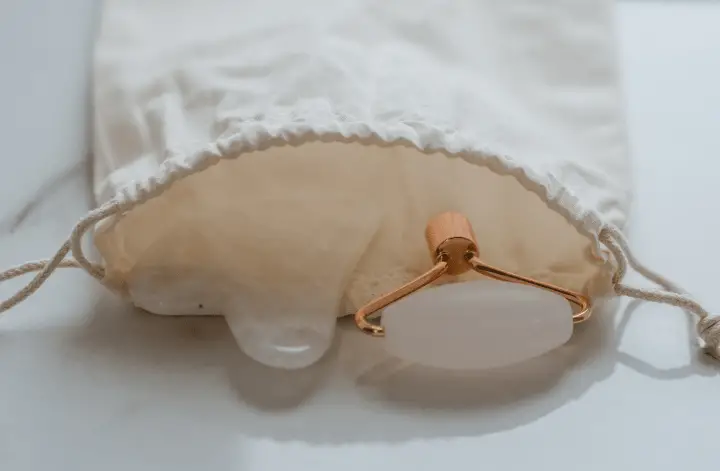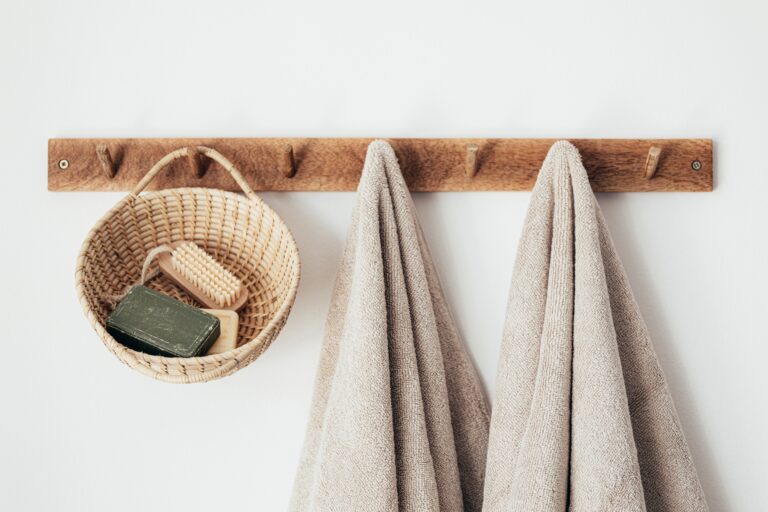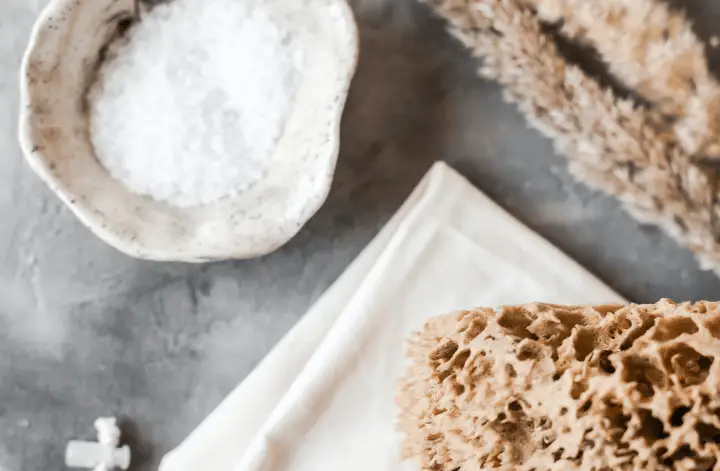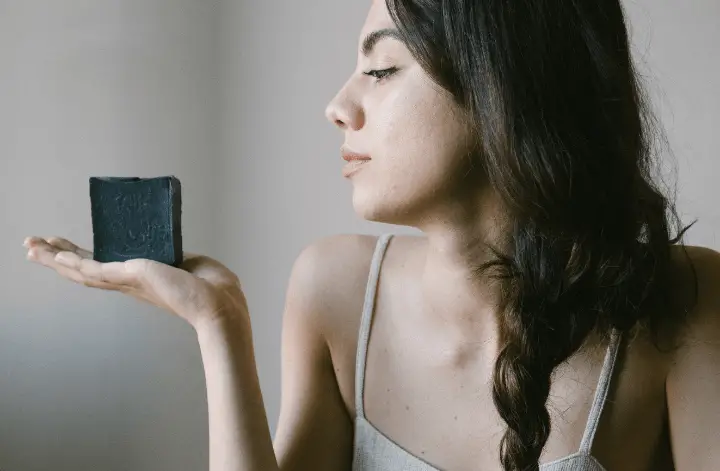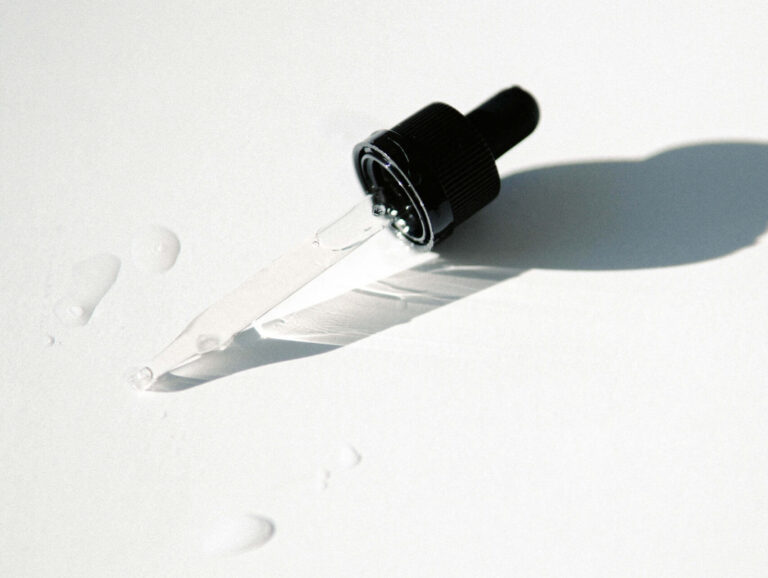I’ve written about water only hair washing before – the ultimate no poo – when I wrote about minimalist DIY hair care, but I thought maybe it deserves its own separate post.
It’s one of those simple-complicated things that depending on who you ask it’s either the easiest and best thing ever, or just a complete mess and not worth the hype.
I think that’s both because we all arrive at water only hair washing from different paths (not to mention different hair types) and people’s definition of “effective” is not the same.
If effective means healthy and clean looking – then yeah, water only washing is very effective. If effective means you want it to look the same way it does when you’re using products, then it may or it may not be.
So if you’re ready to give water only hair washing a try, or you’ve already experimented with it but are having issues – read on!
Is water only hair washing right for you?
A lot of us actually don’t really know what our hair is really like. We’ve been using commercial shampoos all our lives and adding conditioners or styling products in order to achieve specific results. So your actual hair texture and shape might not be to your liking.
Also, let’s not forget the old “grass is greener” effect. People with curly hair want straight hair, people with straight hair want it curly…and just about every variation in between.
Your whole hair care routine might be directed at “correcting” your natural hair type, so giving up hair products entirely might sound extreme and downright impossible.
I think it’s a fun experiment to try for a couple of months or three. You’ll at least have a chance to really get to know your hair and what it does when it’s not being “messed with”. You might be very pleasantly surprised – I was!
My whole life I thought my hair was coarse and frizzy. Turns out it’s soft, wavy and it holds excellent shape. Hair shaft that’s been naturally conditioned with sebum (our natural scalp oil) is much easier to work with and usually will be easier to style.
Water only hair washing is the MOST natural, low maintenance and “no poo” hair care option out there – it’s very liberating when you get it to work!
What are the benefits of water only hair washing?
This sebum is also an important part of the skin’s barrier function, by helping to maintain the correct pH and microbiome balance.
I’ve written about the importance of the microbiome in another post about the immune system, if you want to check that out, but it’s also essential for your skin’s health.
Shampoos and other foam cleansers not only strip the hair and scalp of that natural moisturizer, causing it to overcompensate by producing even more in response, they also mess with the delicate balance that keeps them healthy.
Hot water washes away debris and dirt effectively, helping to eliminate the excess sebum, without stripping the scalp or affecting the microbiome.
Related content: Starting a Zero Waste Lifestyle the Simple Way
How often will you need to wash your hair?
This is something that depends – on lifestyle, type of hair, and personal preference. There is no exact formula.
During the transition phase of water only hair washing you’ll likely feel the need to wash it very frequently. Once your scalp has adjusted, you’ll be able to space out your washes more.
Likewise, if you have a very physically active lifestyle, or you live in a hot place, you will sweat more and therefore feel the need to wash the hair (or scalp) more often.
Also, if you’re not doing something to distribute the sebum (natural hair oils) along the hair shaft regularly, like preening with your fingers or by brushing your hair methodically, you’ll probably have more oil concentration at the roots. This is especially the case if you have curlier or coarse/wavy hair – it needs more of a push.
In my case, my hair is wavy and thick and I work out every other day. I like to wash it every 3 or 4 days during the colder months – I find that’s enough.
However, during the hot summer months I might do it every other day or even every day. It gets really hot where I live and I sweat!
But it also depends on what you call “washing” – on some days I really do it properly, with hot water, massaging my scalp for a few minutes. If my hair looks fine, but I’ve been working out and I feel sweaty, I might just rinse it under cold water to wash off the sweat.
Cold turkey or slow transition?
You’ll achieve the results regardless, it’s just a matter of time and personal preference. Do you want to get results as quickly as possible, even if it’s a bit “painful” for a while? Or do you rather ease into it, give yourself some room to get used to it, even if the results will take longer?
If you go full throttle with water only hair washing, you’ll have a couple of weeks to a month of oily, maybe limp and dirty looking hair and you might feel a bit more exasperation at the look of it.
Depending on your particular situation and where you’re coming from (hair care wise) the transition might be more or less rough. But after that your hair should start to come into its own. It’s very exciting when this happens, it’s like seeing your hair for the first time – its true shape and texture.
If you rather ease into it, and depending on how you go about it, it will take longer of course, but the transition might be less “traumatic”. It also depends if you’re trying to do it by spacing out your shampoo washes more and more, or if you’ve been using other “no-poo” DIYs for a while already.
There’s no one right way to approach water only hair washing – pick the one that feels more doable for you at this moment – you can always switch.
Will your hair smell bad with water only washing?
Simply put, if everything is alright, no. If you notice a “bad” smell coming from your scalp or hair it’s likely due to some kind of yeast overgrowth. But, if by “smell bad” you really mean “doesn’t have a fragrant scent”, then yeah.
Hair that is just washed with water doesn’t really smell like anything in particular. I find the odor pleasant because it’s natural, although it’s completely impossible to describe.
- If you miss the more fragrant scent you get from using products, you can try to make an herbal tea to use as a final rinse.
- If you use vinegar-water rinses (like I do), you can infuse the vinegar with herbs for 1-2 weeks and then use that as your base vinegar. The vinegar option has a more lasting effect in terms of fragrance.
- If you like to use a bit of oil on the ends, you can also make an oil blend using essential oils and use that.
So there are ways to get a more scented result, if you really miss it, but I think a lot of the people who get into water only washing tend not to bother. It just doesn’t smell like anything.
How long until you get good results?
It usually takes a few weeks for the scalp to start adjusting to the new water only hair washing routine. But the truth is that it totally depends on the person.
How long it takes for the scalp to make the adjustments depends on what kind of routine it’s used to before you start washing with only water.
It also depends on how you go about it – cold turkey or slow transition, trying to space out your washes more and more. And speaking of slow transitions, are you alternating water only hair washing with foam-based cleansers or other alternatives, like natural scalp scrubs and powder shampoos?
It can also depend on the quality of the water that you’re exposed to. Hard water is crap for hair (and skin), because the mineral deposits will make it seem rough, dirty and clumpy. If you’re not using a vinegar-water rinse, this may be a factor for you.
It depends as well on your hair type: frizzy or curly hair might have a harder time getting the oils to naturally distribute along the hair shaft in the beginning, when you’re still getting the hang of it.
Here are some general transition tips to start water only hair washing:
- If you’re still using commercial products on your hair and you want to switch to water only hair washing cold turkey, do one final shampoo or soap washing WITHOUT following with conditioner or any other product. This will make sure to get rid of any silicones or other agents that might be sticking to your hair and scalp that water will not be able to clean properly. Finish with a vinegar-water rinse.
- Do a scalp scrub to get rid of any product buildup, so that you’re starting with a clean slate. You can check out a few very basic but effective DIY scalp scrub recipes in this post, but there are a ton of other recipes online as well.
- If you’re spacing out hair washes in your transition phase, don’t use foam-based products to clean your hair. Every time you do that, you’re stripping the natural oils from your scalp and the scalp just compensates for it by producing more. So it’s really just extending the agony.
- Try one of the many “no-poo” alternatives to deal with the extra oil production. I have another blog post about the several natural ingredients you can use to clean your hair, if you want to get inspired. There are lots of natural DIY options out there that don’t include foam or any kind of soap.
WATER ONLY HAIR WASHING INSTRUCTIONS
Water only hair washing can be as simple as it sounds, but in order to get the most out of it and really reap the full benefit there are a few “hacks” that are good to know.
Generally speaking you only really need to do 2 things:
- Loosen the dirt and sebum from your scalp regularly (daily) and distribute it along the hair shaft. This conditions the hair naturally and keeps it looking healthy. You can do that either using your fingers (scritching and preening – see below) or by brushing your hair upside-down for a minute or two.
- When you feel the need to wash your hair, make sure to thoroughly rinse it with hot water for a few minutes, making sure to massage the scalp and use the balls of your fingers to sift through the hair while you’re doing it. The same movements you would do if you were washing off shampoo.
Make sure the water is hot (so that it removes excess oils) but not too hot, because that’s very dehydrating to the hair and scalp.
Finish with cold or cool water to close the hair cuticle and scalp pores. Or better yet, with a cool water-vinegar rinse that will also help keep your scalp clean and healthy.
That’s basically it.
Making water only hair washing easier – general tips:
You’ll see a lot of instructions for water only hair washing online using very specific vocabulary, like “scritching” and “preening”, insisting you absolutely have to do it that way or it will never work.
“Scritching” is what they call the loosening of the sebum on your scalp, by massaging it using the tips of your fingers. “Preening” is what you do after, which is to slide sections of your hair between your fingers to pull that sebum down the hair shaft.
I’ve been washing my hair with only water for about 4 years and I can tell you I’ve never spent any time “scritching” or “preening” – I just use a plain bamboo hair brush.
- Every morning I hang my head upside-down and brush the hair from the base of my neck, all along the scalp, to the ends of my hair for about a minute. After that I get on with my day.
- If I feel that my hair is looking a bit oilier, I wash it later that day – no special preparations or pre-wash rituals. Occasionally I’ll do a scalp scrub just to exfoliate it, the way I do with the rest of my skin.
Both methods achieve the same result, which is to distribute the natural oils your scalp produces all along the length of your hair, so that they nourish it and don’t build up at the roots. This will make the hair look and feel healthy. You can totally try both ways and see which one fits you best.
- After washing your hair, some people recommend you use an old T-shirt or microfiber towel instead of a regular bath towel – supposedly it helps control the frizz. I can’t say I’ve ever felt my hair particularly frizzy by using a regular towel and I actually find that the regular terrycloth towel helps absorb the excess oils from the hair. Nevertheless, give it a go and see which one works best for your hair.
- Whether you have hard water or not, or any kind of scalp issue, I still recommend you finish washing your hair with a vinegar-water final rinse. Besides the water softening effect of vinegar, it is also antimicrobial, antifungal, and it will help keep the scalp at a healthy, slightly acidic, pH – important for the microbiome. 1 part vinegar to 7 or 8 parts water should do the trick.
Do you need extra conditioner?
You can add a third step to the washing routine, which is to use some natural carrier oil on the ends or shaft of your hair to help protect it from split ends.
This may or may not feel necessary – it depends on the state and type of your hair. Usually, after the transition phase of water only hair washing the hair shaft will be getting a regular coating of natural sebum and feel soft and healthy. But for curlier hair types, or very long hair you might still prefer to use a little something on the tips.
You can apply a VERY small amount (a few drops) of jojoba oil to your hands and rub it between your palms before pressing the hair tips between them. Jojoba is the best oil to use in this case because it’s the closest to the body’s own natural oil production (sebum). Grape seed oil is also a good option.
Does the temperature of the water matter?
Yes! The temperature of the water is important for water only hair washing!
In order to remove the excess sebum you need (comfortably) hot water, not just warm. But not too hot or it will be dehydrating to the hair and scalp.
Washing with cool or cold water will preserve the scalp oils, but it will still effectively wash off sweat and dust.
You can use cool or temperate water to rinse off between hot water hair washes. Extend this gradually so that your scalp gets accustomed to producing less oil and it’s not as uncomfortable for you.
The water pressure also matters!
I’ve noticed a considerable difference in the oomph of my hair by just switching shower heads – the better the water pressure coming out of the shower, the better!
What type of hair brush should you use?
Another thing that gets bandied around a lot in the water only hair washing community is the boar bristle brush.
Now, you really do need a good natural bristle brush (meaning, not plastic or metal), but whether that’s a boar bristle brush, a wooden or bamboo brush is really not all that important.
Depending on your hair type or maybe personal preference, one might be better than the other – again, it’s a question of trying.
I personally don’t like boar bristle brushes (or brushes of that kind) because I get the feeling they’re brushing the top part of my hair and not really reaching through to the scalp. Again, my hair is on the thicker and wavy side. I also find that they make my hair look kind of flat.
However, if you have finer and straighter hair, they might be more pleasant to use. Also, if you have curly hair and you’re having trouble getting the sebum to move along the hair shaft, the boar bristle type will give you a better “grip”.
If you already own a natural wooden hairbrush, or a boar bristle brush, I suggest you try it with the one you already have. If after a while you think it’s not working for you, maybe give the other one a shot.
Will water only hair washing work with hard water?
If you live in a place with hard water it can be tricky to get water only hair washing to work for you (considering all the other variables as well).
I always seem to end up in places with VERY hard water, but I suppose because I’ve been using a water-vinegar rinse for over 15 years, I’ve never really had a problem.
There have been times I forget to bring the vinegar with me when I get in the shower. By the time I remember, I’m too lazy to get out and go get it. When this has happened, or if I happen to run out of vinegar, I definitely notice the difference in my hair. It looks like it’s a bit dirty, it kind of flattens at the top and looks “clumpy” in places, and it feels a bit coarse and it’s difficult to brush.
It becomes difficult to run my fingers through it. This is because of the mineral deposits in hard water. If this is the case for you, there a few things you could try:
- A water-vinegar rinse at the end (my personal recommendation) is the best option. I’ve written about this a million times in other posts. It’s great to soften the water, help balance the scalp’s pH, and it’s an antimicrobial / antifungal that will help heal and correct any scalp disorders (like dandruff, seborrhea, etc.).
- Use a good shower or water filter. There are quite a few on the market.
- You can also try to have a good final rinse with distilled or filtered water. I’ve never tried this, but some people in the “no poo” community swear it works.
Related content: A Simple DIY Spa Day Hair Care Routine You’ll Love!
Will water only hair washing cause dandruff and itchy scalps?
The short answer is no.
Dandruff and other scalp issues can be caused by different things: too much yeast in your diet, hormonal imbalance, allergic reactions to products and, yes, poor hygiene.
Water only hair washing is actually a good thing to try, if you’re already suffering from these issues. If you never had them before washing with only water, then consider the frequency of the washes and your hair brushing.
Your scalp needs to breathe and it shouldn’t have too much sweat accumulate for too long.
When you’re washing with regular shampoos, the scalp gets a total stripping of everything – oils, the microbiome, as well as dirt and debris. It then needs to build from scratch every single time (and a lot of times it overcompensates).
When you’re using only water, that elimination is partial and milder, and there’s always a period of adjustment to the new environment, where both the oils and the microbiome are completely redefining. You may need to wash more regularly at first, to help the scalp make that transition.
- Alternate a gentle and healing scalp scrub once or twice a week to exfoliate the dead skin flakes, along with your water only washing routine.
- In this particular case, definitely use a vinegar water rinse at the end! Like I mentioned earlier, vinegar is antimicrobial and antifungal, helping to soothe any redness, itchiness and inflammation.
I really believe everyone should try water only hair washing at least once in their lives. Truly give it a shot for a couple of months or so. Not only can it be the beginning of a real love affair with your natural hair (that so many of us have been “fighting” our whole lives), but it can also really help simplify your life.
Even if you find that it doesn’t work for you, you might still discover that you don’t need as much crap on your hair as you thought you did. And I think that’s always a plus. Let’s face it, this “no poo” movement wasn’t born in a vacuum!
If you decide to give water only hair washing a shot, let me know how you get on in the comments below!
